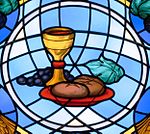https://en.wikipedia.org/wiki/Mass_(liturgy)
Mass (liturgy)
From Wikipedia, the free encyclopedia
For more detailed information on history and theology of Eucharist in general, see Eucharist,Eucharistic theology, and Origin of the Eucharist.
See also: Mass (Catholic Church), Divine Liturgy, and Divine Service (Lutheran)
| Part of a series on the |
| Eucharist Lord's Supper • Communion |
|---|
 |
| Elements |
| Ritual and liturgy |
| Practices and customs |
|
| History |
| Theology |
| Denominational teachings |
| Related articles |
Mass is one of the names by which the sacrament of theEucharist is commonly called in the Catholic Church,[1]Western Rite Orthodox churches and many Old Catholic,Anglican,[2] and Lutheran churches,[3] as well as someMethodist churches.[4][5] Apart from "Eucharist" others are the "Lord's Supper", the "Breaking of Bread", the "Eucharistic assembly (synaxis)", the "memorial of the Lord's Passion and Resurrection", the "Holy Sacrifice", the "Holy and Divine Liturgy" and "Holy Communion". In these denominations, the term Mass often refers to the entire church service in general.[6] Some Protestants employ terms such as Divine Service or service of worship, rather than the word Mass, although other Protestants, such as Anglicans and Lutherans, use the word.[7] For the celebration of the Eucharist in Eastern churches, including those in fullcommunion with the Holy See, other terms such as theDivine Liturgy, the Qurbono Qadisho or Holy Qurbana and the Badarak are normal.
Etymology[edit]
| Look up mass in Wiktionary, the free dictionary. |
Further information: Ite, missa est § Meaning
The English noun mass is derived from Middle Latin missa. The Latin word was adopted in Old English as mæsse (via aVulgar Latin form *messa), and was sometimes glossed assendnes (i.e. "a sending, dismission").[8] The Latin term missaitself was in use by the 6th century.[9] It is most likely derived from the concluding formula Ite, missa est ("Go; the dismissal is made"); missa here is a Late Latin substantive corresponding to classical missio.
Historically, however, there have been other explanations of the noun missa, i.e. as not derived from the formula ite, missa est. Fortescue (1910) cites older, "fanciful" etymological explanations, notably a latinization of Hebrew matzâh (מַצָּה) "unleavened bread; oblation", a derivation favoured in the 16th century by Reuchlin and Luther, or Greek μύησις "initiation", or even Germanic mese "assembly".[10] Already Du Cange (1678) reports "various opinions on the origin" of the noun missa"mass", including the derivation from Hebrew matzah (Missah, id est, oblatio), here attributed to Caesar Baronius. The Hebrew derivation is learned speculation from 16th-century philology; medieval authorities did derive the noun missa from the verb mittere, but not in connection with the formula ite, missa est.[11]Thus, De divinis officiis (9th century[12]) explains the word as a mittendo, quod nos mittat ad Deo ("from 'sending', that which sends us towards God"),[13] while Rupert of Deutz (early 12th century) derives it from a "dismissal" of the "enmities which had been between God and men" (inimicitiarum quæ erant inter Deum et homines).[14]
Mass in the Catholic Church[edit]
Main article: Mass (Catholic Church)
See also: Eucharist in the Catholic Church
The Catholic Church sees the Mass or Eucharist as "the source and summit of the Christian life", to which the other sacraments are oriented.[15] The Catholic Church believes that the Mass is exactly the same sacrifice that Jesus Christ offered on the Cross at Calvary. The term "Mass" is generally used only in the Latin Church, while the Byzantine Rite Eastern Catholic Churches use the analogous term "Divine Liturgy" and other Eastern Catholic Churches have terms such as Holy Qurbana. Although similar in outward appearance to the Anglican Mass or Lutheran Mass,[16][17] the Catholic Church distinguishes between its own Mass and theirs on the basis of what it views as the validity of the orders of their clergy, and as a result, does not ordinarily permit intercommunion between members of these Churches.[18][19]However, in the Decree on Ecumenism, produced by Vatican II in 1964, the Catholic Church also notes its understanding that when other faith groups (such as Lutherans, Anglicans, and Presbyterians) "commemorate His death and resurrection in the Lord's Supper, they profess that it signifies life in communion with Christ and look forward to His coming in glory."[19]
Within the fixed structure outlined below, which is specific to the Ordinary Form of the Roman Rite, the Scripture readings, the antiphons sung or recited during the entrance procession or communion, and certain other prayers vary each day according to the liturgical calendar. For more information regarding the structure and history of the approved Extraordinary Form of the Mass in the Roman Rite see Mass (Catholic Church)

No comments:
Post a Comment